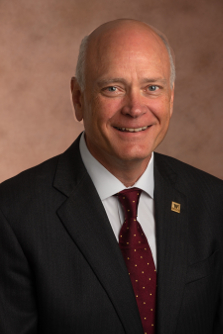
As the newest cohorts of medical students and resident physicians are welcomed to Kalamazoo this summer, they are embarking on an academic year unlike any other, one that will undoubtedly be shaped by the ever-evolving challenges brought forth by the COVID-19 pandemic.
They will join their counterparts in taking part in curricula that will be delivered through a hybrid model of virtual learning, as well as in-person and hands-on instruction. In the midst of the coronavirus, they will have to learn quickly to be nimble, resilient, and tolerant of ambiguity, said Dr. Hal B. Jenson, the medical school’s Founding Dean.
Even with those challenges that could come their way, Dr. Jenson said it is paramount for WMed’s newest students and residents to know that the pandemic – while unprecedented – serves as a reminder of the value of the important work that physicians and other medical professionals do every day to ensure the health and safety of patients.
“Whether it’s caring for patients and their families, discovering the next body of knowledge to make care better in the future, or training the next generation of physicians, the work we do is really important,” Dr. Jenson said. “Even though we are only one person in the world, when you are a doctor in the room with a patient, you are all the world to that patient and that is such important work to be able to provide care to improve the health of the patients we serve.”
The medical school’s newest group of resident physicians arrived in Kalamazoo in June and officially began their training on July 1. Meanwhile, students in the MD Class of 2024 will be welcomed to WMed on Monday, July 27.
Despite the pandemic, Dr. Jenson said the new residents and students are starting their separate but similar journeys at a time when it has never been better or more exciting to be in the field of medicine. He said new technologies and the advancements he has witnessed during his career have brought us to a point now that allowed for the development of vaccine candidates to fight COVID-19 in a matter of weeks instead of years.
“The changes in technology and the advanced knowledge we have acquired have been incredible and really exciting, and it brings with it an excitement for the future because we can have such a greater impact on improving healthcare,” Dr. Jenson said. “We are so much better prepared from the standpoint of being able to develop a vaccine for COVID than we have ever been.”
Dr. Jenson said first-year residents and first-year medical students will, no doubt, feel overwhelmed at times as they take on the new challenges that await them. Even so, he said each of them must embrace becoming a lifelong learner to adequately care for patients now and in the future, and enable themselves to be prepared for the unexpected.
“No one a year ago was making plans on how to respond to a COVID-19 pandemic,” Dr. Jenson said. “There were plans in general but what we have seen at WMed is that although we may not have been specifically preparing for this pandemic, we were well-prepared to respond and be nimble, and meet the needs of our learners with the proper solutions in the moment.
“Medical school and residency training can be overwhelming at times because of all that you need and have to do,” Dr. Jenson added. “It’s good to be in awe but do not be overwhelmed. Medical education is a journey and the reason that medical school and residency are several years long is because they are a journey.”
As he looks ahead to what might come next with the COVID-19 pandemic, Dr. Jenson said medical school leaders and others within the WMed community will have to continue to anticipate that the number of coronavirus cases in Michigan and nationwide are going to ebb and flow until a vaccine is in place, a milestone he is hopeful could occur within the next six to nine months.
Until then, Dr. Jenson said we must not become complacent.
“We have to be diligent about wearing a mask and taking precautions to protect each other,” he said. “The biggest risk we have is becoming complacent.”
